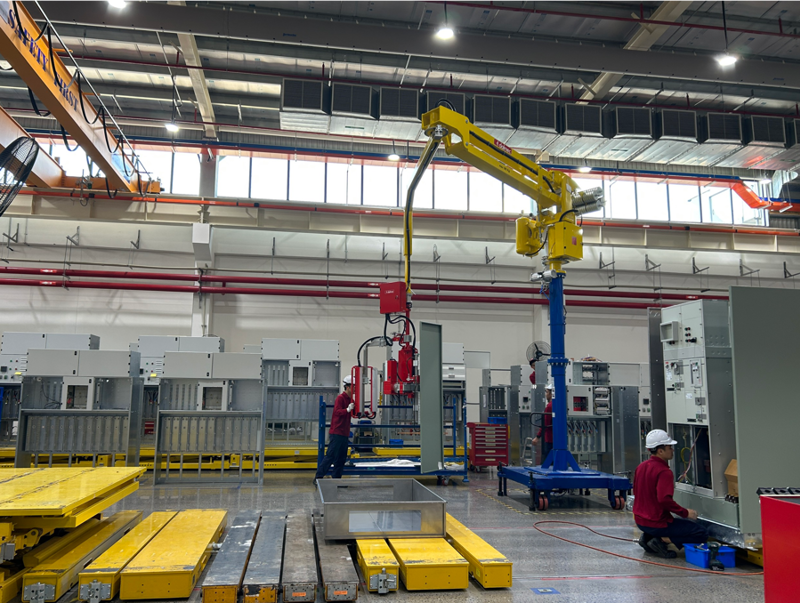Mr. Dominik Meichle, Managing Director of Bosch Vietnam

Vietnam boasts a sizable and well-educated workforce, positioning it as an attractive production hub. The government’s commitment to workforce development is evident through various initiatives, including the recent approval of the 2021-2030 vocational education and training strategy and Decision No. 17 on vocational training support. This underscores the country’s dedication to enhancing training efficiency for the labor market, with substantial investments aimed at aligning local skills with international standards.
The education system has notably shifted its focus to producing tech professionals, offering comprehensive programs in computer science, engineering, information technology, and related fields at universities and vocational schools. This strategic emphasis has attracted global tech companies, resulting in increased investment and job opportunities in Vietnam.
To support the government in upskilling the manufacturing workforce, Bosch Vietnam, in cooperation with LILAMA2, has been offering a German-standard Technical Industrial Apprenticeship since 2013, where apprentices learn on the job. We believe this practical capacity-building exercise should be replicated in other industries and sectors, and Bosch Vietnam is always open to cooperation with other vocational training schools nationwide. We greatly appreciate the existing commitments and ongoing efforts of the Vietnamese Government to make it safer and easier for German firms like Bosch, who often specialize in high technology industries, to scale up investments in Vietnam.
To ensure stable labor supply and improve the quality of workers in the industrial and manufacturing sectors in Vietnam, we are implementing several initiatives, as follows.
At Bosch, both globally and in Vietnam, we actively promote training programs for all associates, ranging from managerial roles to professional staff (covering areas such as technologies, business modeling, and agility, etc.). Additionally, we implement a variety of well-tested leadership and cultural initiatives, including Coaching & Mentoring, Talent Pool Development, and Talent Exchange. These initiatives help our associates enhance their leadership competences, gain international exposure, and participate in regional and global transformation projects.
We are investing in developing an attractive employer branding strategy. Leveraging the foundation of the Global Bosch brand name, we take pride in the recognition of our ideal working environment by professionals. This recognition has led to Bosch consistently ranking in the list of the best places to work for nine consecutive years in Vietnam. Recently, Bosch Vietnam took the lead in the Engineering category of Vietnam’s Top 100 Best Places to Work 2023.
Developing young Vietnamese talent is considered one of our missions. That’s why we consistently provide numerous training and development programs aimed at elevating the skills and competencies of our workforce. We cooperate with leading local universities to host competitions and training programs focusing on Automotive Technology and Software & Engineering. In 2021, Bosch Vietnam invested in establishing labs at the Ho Chi Minh University of Technology (HCMUT) and the Ho Chi Minh University of Technology and Education (HCMUTE) - the Bosch Automotive Lab and the Bosch Transmission Lab. These on-campus practical training centers benefit technical students each year, majoring in various automotive engineering programs. We also organize technical competitions to provide students with opportunities to develop their knowledge and skills.
Last but not least, we ensure a holistic combination of working culture and benefits, adopting a human-centric approach. We believe that by doing so, we will continue to attract more talent from the market to join our company.
Ms. Tham Tran, Head of Human Resources at Triumph International Vietnam

In the past two years, due to the impact of Covid-19, there has been a significant change in the lifestyles and work preferences of the workforce in Vietnam. Workers tend to opt for jobs that offer high flexibility and work-life balance, especially with the rise of e-commerce and the availability of freelance opportunities and online businesses. This shift has affected the supply of workers for the industry and manufacturing sectors in Vietnam, both in terms of quantity and quality.
At Triumph International’s factory in Vietnam, which employs over 2,500 workers, there is a continuous need to recruit skilled garment workers. However, only 10 per cent of the recruited workforce is immediately employable, while 50 per cent require retraining even though they possess some skills, and 40 per cent need extensive training for 30 days before joining the production process.
Despite the challenges, Vietnam remains a promising labor market in the region, attracting many global businesses and FDI, particularly in the manufacturing and production sectors. One of Vietnam’s strengths lies in its low labor costs, which is crucial for businesses facing economic challenges and seeking cost reduction strategies. Additionally, Vietnam is known for its young, dynamic workforce with a strong desire to learn and progress, making them adaptable to training by businesses or cooperation with foreign experts.
However, the reality of the labor market doesn’t always meet businesses’ expectations in terms of the quantity and quality of job applicants. This affects recruitment timelines and the efforts invested by businesses in training and retraining workers.
Training and development are crucial focuses for Triumph International Vietnam to enhance the quality of its workforce in both the short and long term. The company designs training programs tailored to different groups, including workers, technical teams, supervisors, and managers. English communication skills training is a key program aimed at improving employees’ language abilities, opening up opportunities for professional development and cooperation with foreign experts. The company also progressively develops succession training programs for critical positions to ensure its long-term growth and sustainability.
Ms. Nguyen Thi Bich Hong, General Director of HR2B

In recent years, the quality of the manufacturing workforce has predominantly focused on the technical sector. In Vietnam, technical workers have long been highly regarded due to the abundant training resources at technical universities and colleges, resulting in skilled graduates. Young Vietnamese are known for their intelligence, adaptability, and quick grasp of technical skills, making them valuable assets. However, there is a shortage of experienced managers and specialized engineers within FDI corporations and large factories.
Over the past two years, the quality of the industrial and manufacturing workforce has faced challenges, particularly in meeting the demands of automation and robotics. The rapid advancement of Industry 4.0, AI, and high technology has necessitated the integration of these technologies into manufacturing processes, creating a skills gap between theoretical knowledge and practical application.
Vietnam benefits from renowned technical institutions such as Bach Khoa University, the Natural Sciences University, the SP Technical University, and FPT University, which produce high-quality graduates for the labor market. Vietnamese students and workers are disciplined, ambitious, and motivated to advance in their careers. With Vietnam’s status as a global manufacturing hub, job opportunities are abundant.
However, challenges persist, including a lack of managerial experience and deep technical expertise, especially within longstanding multinational FDI corporations. Vietnamese workers lack the time and experience to fully understand the specific requirements of these organizations.
Internal training remains the most effective tool for businesses, allowing them to tailor programs to their specific technological needs and actively engage in workforce development. Businesses also cooperate with educational institutions to provide internships and practical training, thereby building a skilled workforce proactively.
Educational institutions receive government investment to incorporate the latest updates from industry practices into their teaching curriculum, fostering a more responsive educational system to the needs of the manufacturing sector.









 Google translate
Google translate